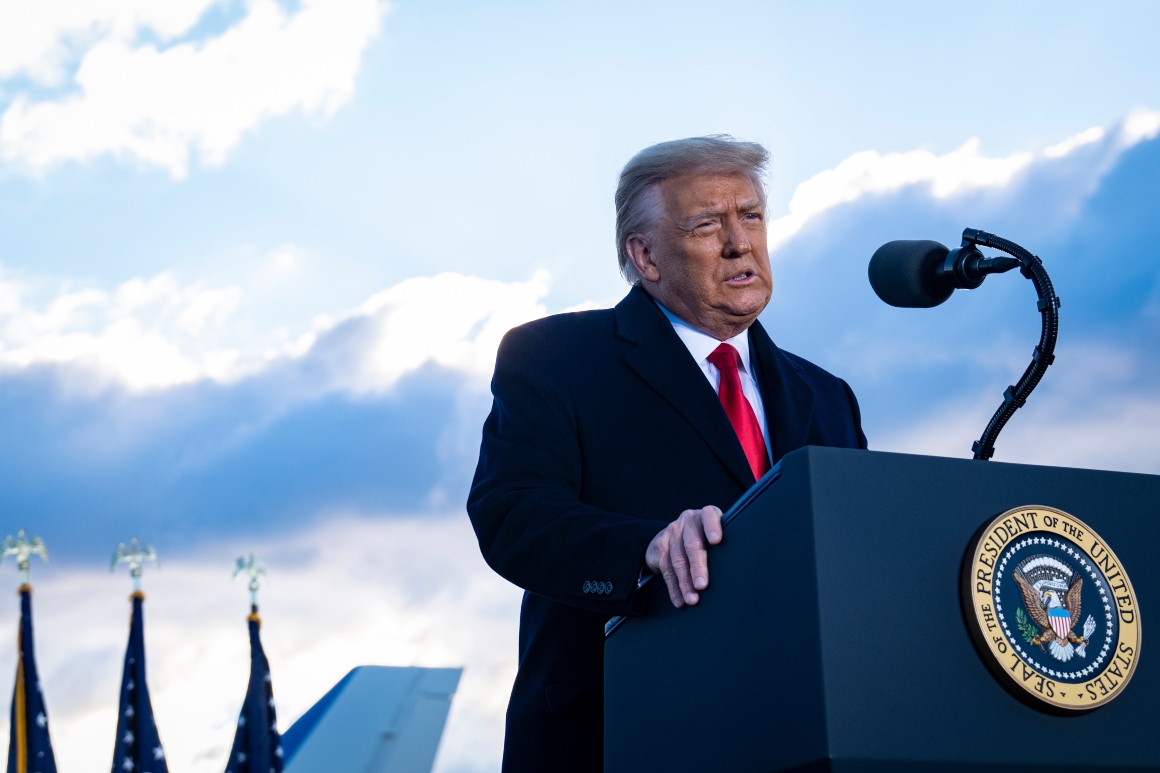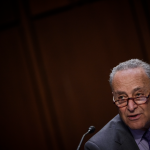A top political aide to former President Donald Trump spent the weekend quietly reassuring Republican senators that the former president has no plans to start a third party — and instead will keep his imprint on the GOP.
The message from Brian Jack, Trump’s former political director at the White House, is the latest sign that Republicans considering an impeachment conviction will do so knowing that Trump may come after them in upcoming primaries if they vote to convict him for “incitement of insurrection.”
Jack did not mention impeachment in his calls. But he wanted the word to get around that Trump is still a Republican — and for many, still the leader of his party.
“The president wanted me to know, as well as a handful of others, that the president is a Republican, he is not starting a third party and that anything he would do politically in the future would be as a Republican,” recounted Sen. Kevin Cramer (R-N.D.). “The Republican Party is still overwhelmingly supportive of this president.”
On Monday evening, Trump’s second impeachment trial began unfolding — and Republicans started deliberating in earnest over how, or even whether, to defend the president.
The trial will test how loyal Republican senators will remain to the former president following his departure from the White House and what kind of grip he still maintains on the GOP conference. While most Senate Republicans are not expected to vote to convict Trump, almost no one has defended his rhetoric after a riot that left five dead and the Capitol ransacked.
Trump has already threatened his critics in the Senate GOP with primary challengers, and conviction votes would only bring more attacks from the former president. On Monday, Sen. Rob Portman (R-Ohio) announced his retirement, allowing him to take in the trial without thinking about his reelection campaign next year. Sen. Pat Toomey (R-Pa.), who is also retiring next year, has conceded that Trump committed impeachable offenses. He declined to talk about the trial on Monday evening.
Trump “has the potential to continue to have a major influence on the party,” said Sen. Mitt Romney (R-Utah), who was the sole GOP senator to vote to convict Trump last year and who has excoriated Trump’s role in inciting the Jan. 6 riot.
Trump’s influence “was significantly diminished by his perpetuation of the ‘Big Lie.’ That he won the election and that it was stolen from him. I don’t think the facts have borne that out,” Romney added. “Clinging to the lie will diminish his influence over time.”
Though Trump has absorbed more criticism from Senate Republicans over the last three weeks than at any time since he won the 2016 election, few are willing to be as vocal as Romney on the eve of the trial.
These days Republicans are leaning on an argument that the impeachment trial is unconstitutional, which might only be tested if Trump is convicted and the result goes to the Supreme Court.
On Tuesday, Senate Republicans will hear that argument at a party meeting from Jonathan Turley, a conservative legal scholar who says the impeachment is “at odds” with the Constitution, according to two sources. Others on the right, including at the Federalist Society, have said it’s constitutional to hold an impeachment trial for an ex-president.
Even some of the president’s closest allies have used strong words to condemn Trump’s role in the Jan. 6 invasion of the Capitol by pro-Trump supporters. It’s a stunning turn from Trump’s first impeachment trial, when only a handful of senators conceded that Trump acted irresponsibly in pressuring Ukraine to investigate his political rivals.
“The ex-president’s rhetoric on the day was inflammatory. I think it was irresponsible. I think it was wrong,” said Sen. Josh Hawley (R-Mo.), who helped lead objections to the certification of President Joe Biden’s win in the Senate. “This impeachment effort is, I think, blatantly unconstitutional. It’s a really, really, really dangerous precedent.”
Sens. John Barrasso (R-Wyo.) and Mike Braun (R-Ind.) were among the senators who quickly rushed to the cameras last January to defend Trump. On Monday they attacked the constitutionality of convicting Trump but indicated they have no plans to reprise their role as Trump’s rhetorical bulldogs.
“No, I don’t,” said Braun.
And unlike during last year’s impeachment trial, when Senate GOP leadership was pushing the caucus to vote against hearing from witnesses, Senate Minority Leader Mitch McConnell (R-Ky.) and his team are taking a more hands-off approach. After closely coordinating Trump’s defense with the White House a year ago, McConnell has said he would listen to both sides’ arguments before deciding how to vote.
“It’s just a different, entirely, dynamic than what we had,” said Senate Minority Whip John Thune (R-S.D.). “This is an issue where nobody’s being whipped, everybody’s going to do what’s in their best interest for their constituencies and their conscience and people are being asked to vote their conscience.”
Still, the appearance by Turley at a party meeting indicates that GOP leaders are strongly considering joining the constitutional arguments against impeachment. Sen. Joni Ernst (R-Iowa), a member of leadership, said on Monday night that "President Trump exhibited poor leadership and holds some responsibility for the anarchy," but added she was concerned impeaching a former president sets a "dangerous standard."
Several Senate Republicans are citing their status as jurors when asked if they’ll stick up for the former president. Sen. Lindsey Graham (R-S.C.), a Trump ally who has ripped Democrats for impeaching the ex-president, said he has faith in Trump’s lawyers and that Trump needs to “trust them.” A fellow South Carolinian, Butch Bowers, will lead Trump’s impeachment defense.
It’s become a common adage within the Senate GOP that if the trial had occurred on Jan. 7, Trump might have seen a flood of Republicans looking to make a clean break with him. But now the final vote might not take place until late February — and the number of GOP senators truly weighing whether to convict the president is likely short of the 17 needed to join all 50 Democrats.
“A lot of people made strong statements, and I put myself in the category, of what the president’s role was, particularly right after Jan. 6 happened. And the disappointment and shock,” said Sen. Shelley Moore Capito (R-W.Va.). “And I suppose as time goes on the political considerations begin to weigh in.”
But she added that something more vivid is on many senators’ minds.
“It’s more a function of being seated on the Senate floor as an insurrection is rising behind you,” she said. “You can hear it and watch the vice president be whisked out.”





















